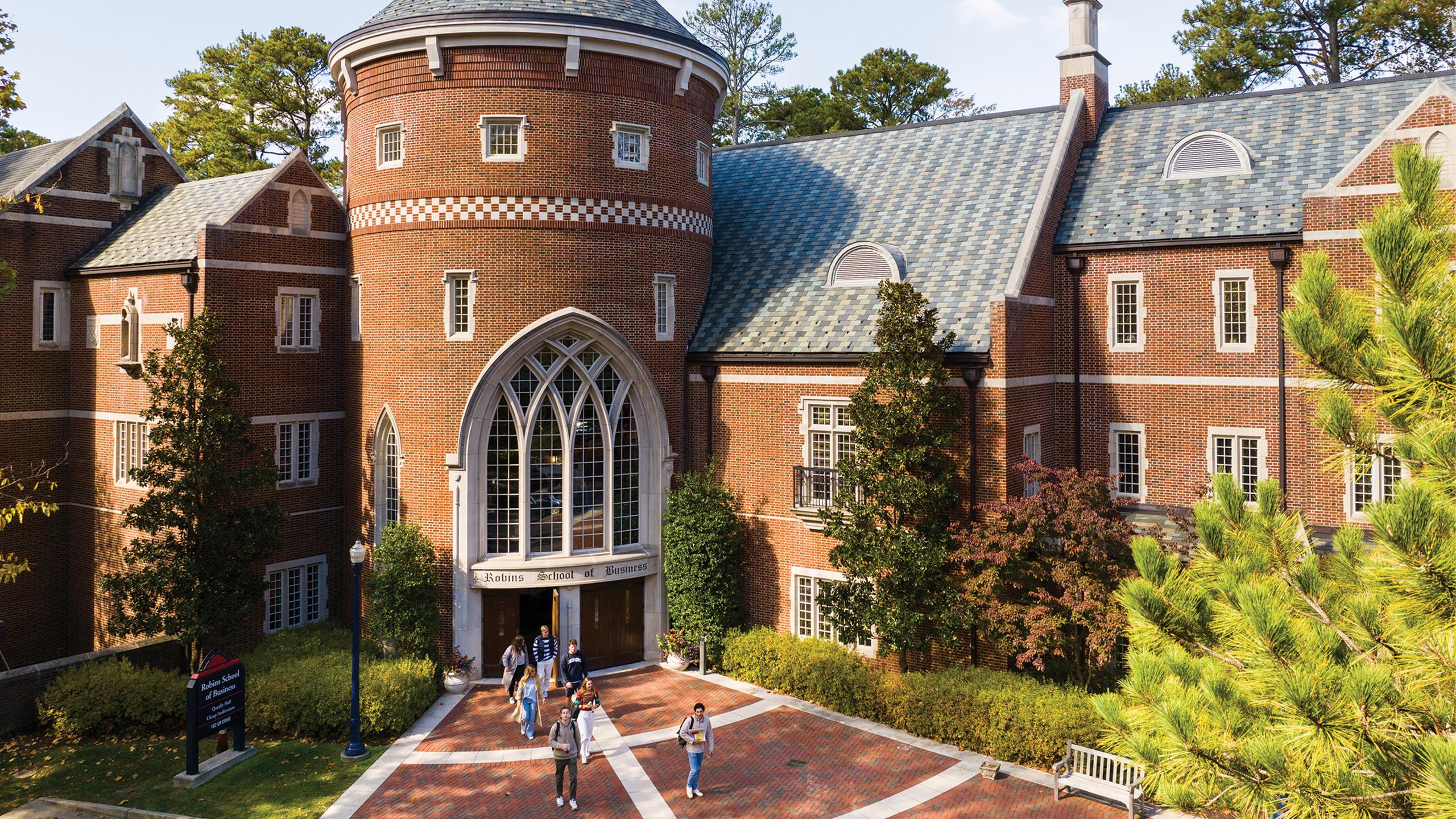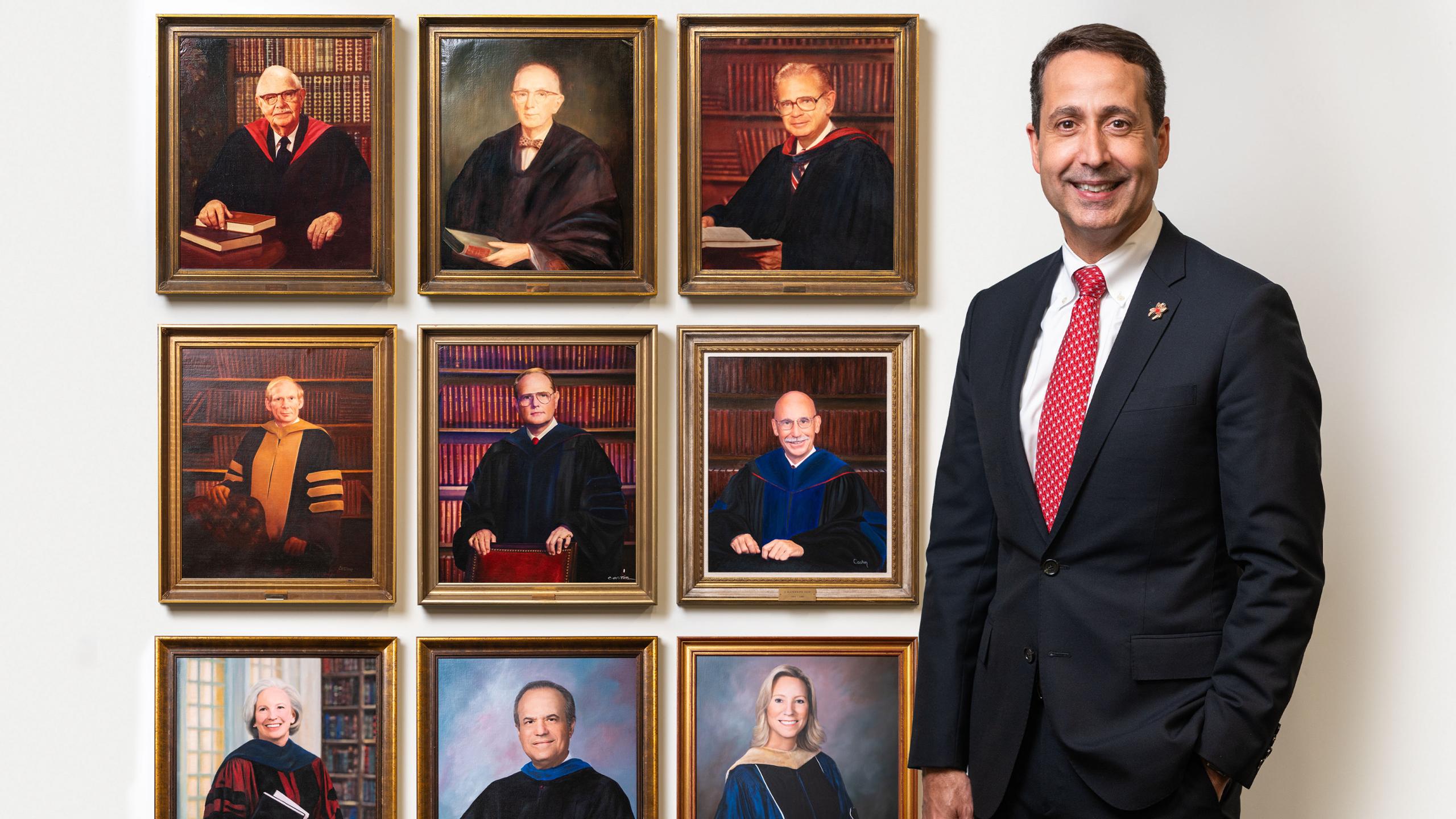
the Robins School of Business celebrates its 75th anniversary, Dean Miguel “Mickey” Quiñones is focused on honoring its legacy of excellence and inspiring pride in the achievements of students, faculty, staff, and alumni who have shaped industries, influenced policies, and impacted their communities to create better futures for everyone.
“We have a responsibility for ensuring that the next 75 years are as impactful as the last,” he said. “We rest on the shoulders of those who came before us. They adapted to societal changes and the needs of the business community over time. We’re a point in time in an unbroken continuum.”
The anniversary celebration is an opportunity to revisit the history and roots of the business school, which date back to an evening school program created by the university in 1924. Twenty-five years later, the university merged the evening school with Richmond College’s economics and applied economics departments to form the school we know today, now called the Robins School of Business. Its first classes began on Monday, Sept. 12, 1949. At a time when the university divided men and women into Richmond College and Westhampton College academically, the new business school was open to everyone.
Documents from the school’s creation highlight how it has long been connected to and serving the needs of the business community. A 1949 prospectus sent to leaders of the local business community notes that 40% of nationwide college graduates were entering business, “but only 6% have had education in business.” This was a particular problem for the Richmond region because, the prospectus notes, “all of us are aware that Richmond is the largest business center between Baltimore and Atlanta.” The document went on to outline the many advantages of establishing the School of Business at Richmond, with the hope of securing local business leaders’ support.
As Quiñones reflects on the school’s history and looks to its future, he feels a profound sense of responsibility. Walking through the dean’s conference room, lined with portraits of his predecessors, he’s reminded of the challenges each faced in their time.
“Each of them had a different situation to deal with,” he said. “I’m guessing that wherever my portrait hangs, somebody will look at it one day and say, ‘Oh, that person was dean during the pandemic,’ and they’ll think about what we had to go through during that time.”
Quiñones, who is also a professor of management, notes that many of the priorities outlined in the first dean’s report from 1950 — such as coeducation, a liberal arts foundation, and the use of technology in the classroom — remain relevant today. He uses the metaphor of “widening the aperture” to describe the school’s evolution over its first 75 years.
“I would argue that we have always had the same vision, except that we’re now more expansive about how we do it,” he said. “Back then, our students tended to be more regional, even local. Now our students come from everywhere, and they go on to work all over the world. Our positive impact is broader now.”
Ultimately, Quiñones hopes the 75th anniversary will inspire a sense of stewardship among the university community and the school’s alumni. “We have immense resources here, but also an immense responsibility,” he said. “We always want to adapt and do better for our students and for society. Change is inevitable, and change is a good thing. It’s our responsibility to prepare for the next 75 years.”

“We rest on the shoulders of those who came before us. They adapted to societal changes and the needs of the business community over time. We’re a point in time in an unbroken continuum.”

HOW IS BUSINESS EDUCATION EVOLVING AS THE SCHOOL BEGINS ITS NEXT 75 YEARS?
Faculty in the Robins School of Business offer their insights into how business education is changing — and how it’s not. Here are some key areas:

ASHLEY AUSTIN, associate professor of accounting

SARA HANSON, associate professor of marketing

CASSANDRA MARSHALL, associate professor of finance

SAIF MEHKARI, associate professor of economics

RANDY RAGGIO, professor of marketing

JOYCE VAN DER LAAN SMITH, professor of accounting and senior associate dean for undergraduate business programs

Emerging technology and data
Faculty expect AI and large-scale data analysis to become even more deeply embedded throughout the curriculum. “I think technology is going to continue to be a big factor changing what we need to teach our students and how we teach them because it’s changing how companies are conducting business,” says Ashley Austin, associate professor of accounting. “Generative AI tools are changing a lot of work. Figuring out the value that professionals can add on top of those tools — the human piece — is even more important than it has been.”
The focus will be on teaching students to think critically about technology, not just how to use specific tools. “AI and other technologies will enable things we can’t even imagine,” Quiñones says. “Our job is to prepare students to think analytically about novel situations.”
The ability to work with and interpret large datasets will be crucial. “Business education will have to adapt to understand how we teach our students to be in this new realm,” says Saif Mehkari, associate professor of economics. “AI is clearly the fashionable piece of this, but just think about the importance of being able to work with large amounts of data. Getting insights from humongous datasets to improve business processes is a big, big area.”

Experiential and project-based learning
“Business education will be even more experiential,” says Randy Raggio, professor of marketing. “Students work on projects with live clients and do projects in so many of our classes across the curriculum.”
He cites the example of the Spider Business Hub, which brings business students together with organizations in the Richmond area and beyond to build client relationship skills through project-based learning. The hub is expanding its reach this year with clients and industries and will now work with students and faculty in more than a dozen marketing and management courses.
Sara Hanson, associate professor of marketing, is the hub’s director. She notes that such experiences help students develop critical professional skills. “The Spider Business Hub is a way for students to put themselves out there and jump right in,” she says. “It’s two-pronged: showing actionable ways to use the things that they’re learning in class and developing their professional skills through interactions with clients.”
Cassandra Marshall, associate professor of finance, adds that experiential learning helps students see the real-world relevance of their studies. “Application is important,” she says. “Going through the exercise of working with a real client helps them learn more than just copying something down or filling in numbers in a formula.”

Sustainability and ESG
Sustainability and environmental, social, and governance (ESG) issues will likely become more prominent in business education. “I think sustainability is huge,” says Joyce van der Laan Smith, professor of accounting and senior associate dean for undergraduate business programs.
Faculty note that students are increasingly interested in these topics. “Students have a real desire to work for companies that have a purpose,” says Hanson, “whether that’s sustainability from an environmental standpoint or from the standpoint of connections to their community.” Mehkari agrees: “I think more and more of this generation that’s coming up cares a lot about sustainability. It’s not just about the environment. There’s also the business aspect of it. How do you make businesses sustainable and products that will last?”



THEN & NOW
Some of the core topics taught to the first class of School of Business students are still taught today. Examples include courses in accounting, business administration, economics, management, and marketing. Other areas of focus that are an important part of preparing students for the careers that lay ahead of them wouldn’t be recognizable to the school’s first students. Here’s a few:
- Data management and analysis
- Digital marketing
- Sustainability and the corporate social responsibility (CSR) model
- Management information systems
- Behavioral economics and decision sciences
- Artificial intelligence and machine learning
- International finance and management
"I think as we go forward, there’ll be more cross-department, cross-curriculum approaches to solve bigger problems in the world and make sure our students are ready for that."

Interdisciplinary Learning
Austin sees business education becoming more interdisciplinary. “Currently, we have these disciplines — accounting, finance, marketing, and such — hardwired as different departments, majors, and concentrations. But I think as we go forward, there’ll be more cross-department, cross-curriculum approaches to solve bigger problems in the world and make sure our students are ready for that,” she predicts.
Sustainability is one major area where this cross-disciplinary approach is already taking shape, she says, pointing to the role of accountants in creating and providing assurance for sustainability reports. Cybersecurity is another growing focus area that spans multiple disciplines. “Accountants are good at assessing the risk and putting in controls to prevent the cyberattacks,” Austin says, but fully covering the topic requires input from business analytics, computer science, and other fields.

Adaptability and Lifelong Learning
Given the rapid pace of change, business education will need to prepare students to be adaptable and committed to lifelong learning more than ever. “The ability to pivot quickly is becoming more important,” says Hanson. Resilience is important, too. “The ability to not associate too much negativity with failure is an important part of that,” Randy Raggio says. “The pace of change is always accelerating, so it’s important that we’re always learning, exploring, and trying to figure new things out.” Smith adds that faculty themselves need to model this adaptability: “We have a responsibility to make sure that we ourselves are not getting complacent and that we’re constantly learning about what’s coming down the pipeline.”

Critical thinking, communication, and interpersonal skills
Some things won’t change. Faculty stress that critical thinking, communication, and interpersonal skills will remain essential elements of business education. “The foundation of what we do will stay the same,” Marshall says. “What we do really well in this university and in the business school in particular is teach students how to think about problems and how to make informed, calculated decisions.” These skills are especially important as technology and tools change. “Part of my teaching is helping students understand where AI can go wrong and that their value is going to be in the nuance,” Hanson says. Interpersonal skills will also remain critical. “How you talk across racial, economic, social, and other lines of difference, especially in a business setting, is a very crucial skill,” Mehkari says. “As the economy becomes more diverse, there will be more need to interact with people who are different than us.”
